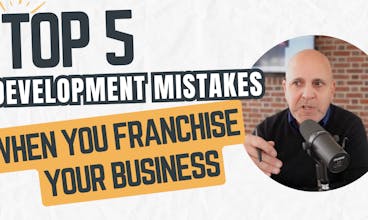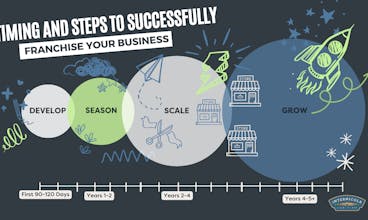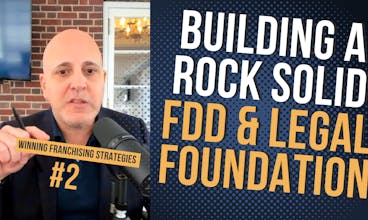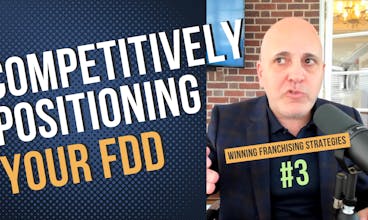Franchise Development Mistakes
When it comes to franchise sales, the right financial positioning can set your offering apart from competitors and attract qualified buyers to your brand.
But what does it take to achieve good financial positioning, and how can you avoid mistakes that might undermine your franchise sales further down the road? From competitively structuring your Franchise Disclosure Document (FDD) to effectively communicating your franchise system’s economic story, there are plenty of ways to position your brand for success. One of the most important, though, is knowing how to avoid errors that could leave your franchise in a weak place in the future.
In this guide, we’ll explore the common financial positioning mistakes franchisors and franchise developers make – and how to avoid them as you grow your business, including:
- Not identifying your brand's financial positioning
- Not communicating your brand's ROI potential
- Working with the wrong franchise development company
What is financial positioning in franchising?
In franchising, financial positioning refers to a franchise offering’s financial position compared to competitors in its industry, category or investment range. Financial positioning is determined by several factors including the offering’s category, return-on-investment potential, financial track record and more.
Common Financial Positioning Mistakes
As a franchisor, leveraging your franchise system’s financial position is critical for selling franchises. By understanding the factors that can elevate your brand’s financial position, you can differentiate your offering and tell a better economic story to prospective buyers while avoiding missed opportunities and lost sales.
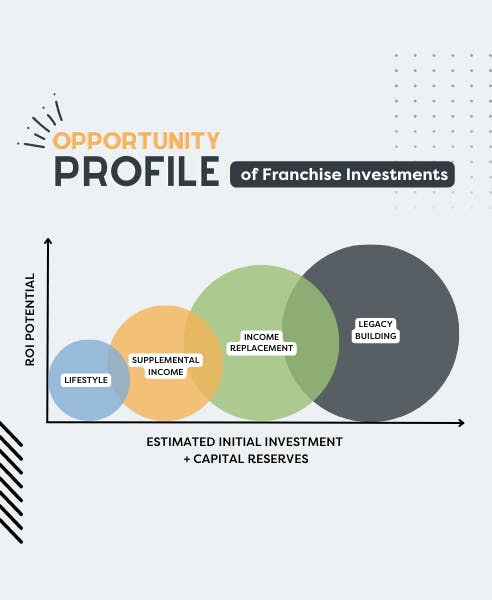
Mistake #1: Not Identifying Your Brand's Financial Positioning
A common mistake franchisors and franchise developers make when financially positioning a brand is failing to identify the category or space it falls under. Because different types of franchise offerings provide different benefits to franchisees, knowing which space your offering belongs in is critical for attracting the right buyers.
Common categories of franchise offerings include:
Lifestyle-based opportunities
Supplemental income
Income replacement
Legacy-building
By determining the right category for your franchise offering, you can tailor your marketing strategies to the demographics of your target franchisees – and attract qualified candidates whose goals and values align with yours.
Mistake #2: Not Communicating Your Brand's ROI Potential
Another common mistake franchisors make when financially positioning their brand is failing to tell its economic story. Although startup costs can vary from organization to organization, a good rule of thumb to follow is that the more expensive a franchise offering’s estimated initial investment is, the more necessary it becomes to demonstrate a strong return-on-investment potential to brokers and prospective buyers.
Leveraging the FDD
Telling a strong economic story about your franchise brand is often necessary to differentiate it from competitors’ offerings. Unfortunately, franchisors and franchise developers sometimes ignore or neglect the opportunities that a competitively positioned FDD can offer – especially when it comes to attracting properly-capitalized franchisee candidates.
Item 7
The disclosures contained in Item 7 of the FDD are intended to help franchisees understand the initial costs associated with opening their franchise business. Those costs include, but aren’t limited to, the following:
Training expenses
Prepaid expenses
Purchased and/or leased equipment
Startup inventory costs
Real property, including leased and purchased
Because investing in a new business can sometimes feel risky to prospective buyers, demonstrating how those numbers are offset by a strong ROI potential can be helpful. To improve your brand’s financial positioning, consider addressing your Item 7 disclosures in a way that communicates the benefits franchisees can expect to get back from their investment.
Item 19
One of the more common financial positioning mistakes franchisors make is failing to properly structure their Item 19 financial performance representations. Because the financial disclosures contained within Item 19 of the FDD can offer brokers and prospective franchisees important insights into your brand’s ROI potential when prepared properly, it’s critical to leverage its disclosures to tell a financial success story.
When preparing Item 19, it’s often smart to go beyond the boilerplate. Consider diving deeper into your brand’s numbers and tell an economic story that communicates its ROI potential.
To competitively position your Item 19 disclosures, consider addressing the following:
Unit-level economics
Gross sales by category
Labor costs
Food and/or inventory costs
Gross profits
Expenses like rent or leases
Cash flow calculations adjusted to reflect initial investment
How profits correlate with initial investment and costs
By communicating the value of your brand through your Item 19 disclosures, prospective franchisees can get a better idea about the income and ROI potential associated with your franchise system.
Mistake #3: Working with the Wrong Franchise Development Company
While there are plenty of excellent franchise developers to choose from in the industry, not all franchise development companies provide the same level of value and expertise. In particular, “one-stop franchise development shops” that claim to handle every aspect of the franchising process – from legal to marketing to franchise sales – sometimes fall short on their promises.
Because of that, it’s important to do due diligence before working with a franchise developer. By ensuring they have a good reputation and are qualified to provide all of the services they offer, you can avoid legal headaches, missed opportunities and wasted resources.
How can franchisors prevent financial positioning mistakes?
As a franchisor, ensuring that your franchise offering is financially positioned for success is critical for successfully growing your business. To prevent mistakes during the franchise development process, remember to do the following:
Know your brand – and your numbers.
Ask for help when you need it.
Work with a reputable franchise developer.
Have a franchise attorney prepare and review your legal documents.
By taking the time to financially position your brand for success as a franchisor, you can avoid wasting time, money and resources while focusing on what’s most important: scaling your brand.
If you’re ready to financially position your brand for success, we can help. Contact us to learn about our franchise development services.


